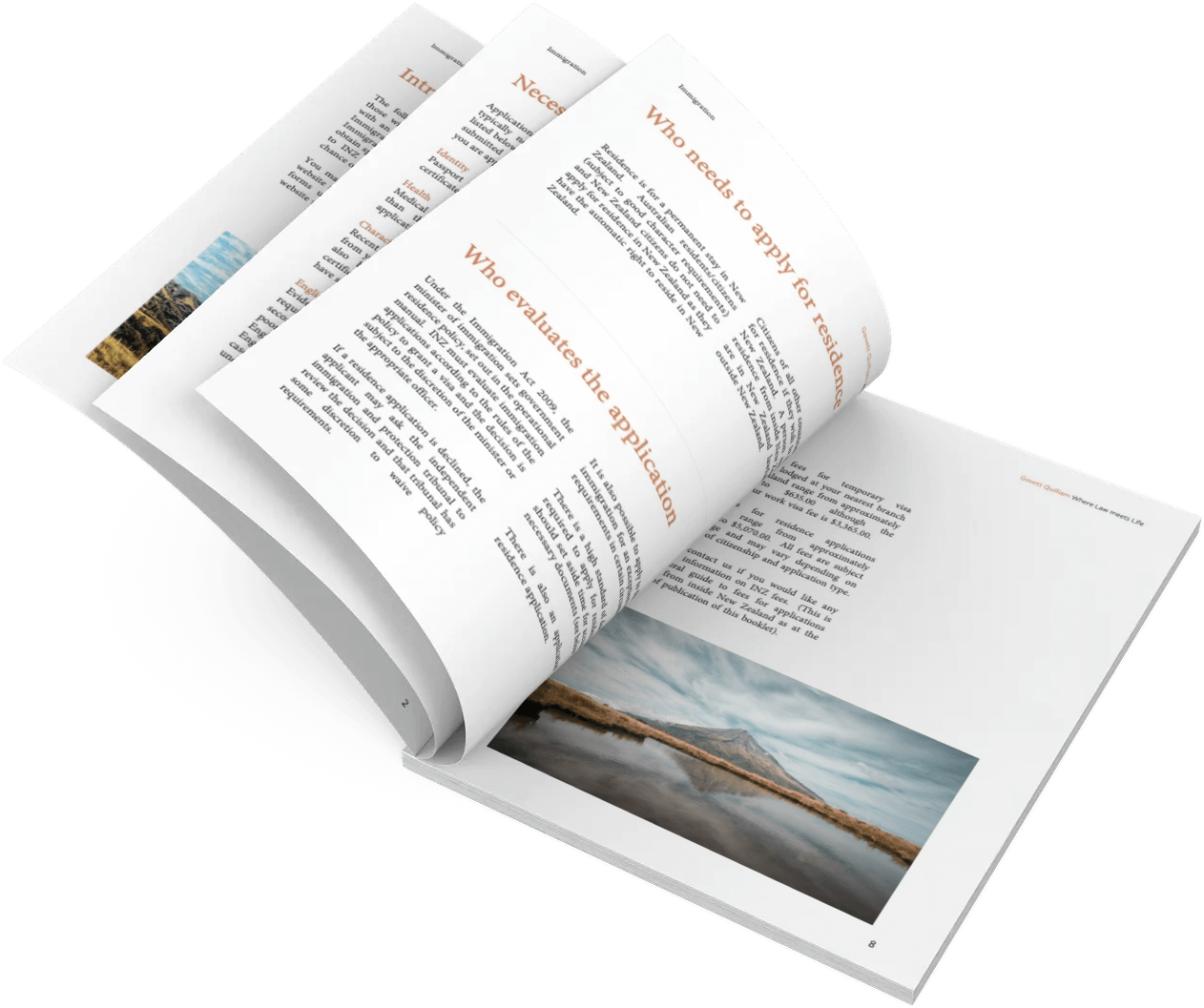Related Posts

Selections resume for the Skilled Migrant Visa Category

New Active Investor Plus Visa - open for applications

'Immigration Rebalance' Bringing Major Changes To NZ Visa Settings

What The Border Opening Means For New Zealand Visas

5-Step Plan Announced To Reconnect New Zealand To The World

The rules governing New Zealand’s immigration can be confusing. The added complexity of a global pandemic, border closures and rapidly-changing policies haven’t helped. Here’s a brief snapshot of what we are seeing in the immigration law space, a heads-up about some of the impending changes and some things to think about if you are a visa holder or if you employ migrant workers.
What we’re seeing
The immigration law changes, predominantly in response to COVID-19 have resulted in a great deal of frustration and anxiety for those affected. There have been many conversations around possible change to the policies to alleviate some of the issues around skill-shortages and residency pathways in New Zealand. However, it is largely a “wait and see” for Immigration New Zealand’s approach to these issues.
Our primary concern during this period of change has been to stay on top of the ever-changing immigration policy and instructions (sometimes as frequent as weekly updates). The task has been to keep our clients continually informed. Often we receive enquiries from employers and migrant workers following an announced change, who are anxious to know what the implications of the changes are for them. Many are eager to renew their current accreditations or visas under the current immigration policies, due to the many unknowns of future policies and visa requirements.
COVID-19 – Border Closure and Managed Isolation and Quarantine (MIQ)
With the closure of the borders and strict entry requirements, people wanting to enter New Zealand must have a “critical purpose” as defined under the immigration instructions. This category of “critical purpose” is also continually changing, in order to allow people with the necessary skills New Zealand needs to arrive and work.
However, in some instances, even those who would meet the criteria for a critical purpose visa, and the border entry requirements, still cannot enter New Zealand due to difficulties with the MIQ booking system. Recently, a hold was placed on issuing vouchers for the booking system. This has been a well-known source of frustration for people overseas who are eligible to return but practically cannot.
Immigration New Zealand have also been closing visa processing offices around the world, as an adaptation to COVID-19, in order to reduce costs and move to an online system where possible. This transition has significantly impacted processing times of applications. Further, Immigration New Zealand cannot legally approve a visa for an offshore applicant who is unlikely to meet the border-entry requirements. In July this year, Immigration New Zealand lapsed and refunded around 50,000 applications for overseas applicants that it could not approve.
Skilled Migrant Category
Since the border closure in March 2020 as a result of COVID-19, Immigration New Zealand stopped drawing expressions of interest (EOI) from the pool. However, they have continued to accept EOIs into the pool. There are said to be around 10,000 EOIs for the SMC visa. We continually receive queries from highly-skilled overseas applicants eager to migrate to New Zealand under this category, however, they appreciate the process will not be a timely one. Once an EOI is selected from the pool, Immigration New Zealand have indicated it can take up to 27-months to process. For some, this is sufficient to consider alternatives and migration to other countries.
The Minister is yet to make announcements about when the selections will resume, and whether there will be any changes to the selection criteria and requirements. Many, including us, are eagerly watching this space with anticipation.
Online and streamlined visa application processes
Immigration New Zealand’s transition to a more robust online platform has had the positive effect of more visas being able to be processed online. This was extremely beneficial, particularly during the August 2021 lockdown where where Immigration New Zealand were unable to process paper applications.
Relationship-based visas
People’s circumstances are continually changing. We have also been required to advise clients who had separated, but remained on a partnership-based visa. In these instances, as with any change in circumstances, one should act as quickly as possible and keep Immigration New Zealand informed of any changes. No longer meeting the criteria for a visa but remaining on that visa without notifying Immigration New Zealand can potentially jeopardise a future visa application.
Investor Resident Visas
Occasionally we receive queries from investors considering migrating to New Zealand under the Investor Category 1 and Investor Category 2 visas. Immigration New Zealand have not recognised this as an exception to border-entry requirements.
We are hopeful a border exemption may be considered for these types of resident visas, which would see great investment into the New Zealand economy. Applicants under these categories are required to invest a minimum of $10million for 3 years Investor 1 or $3million for Investor 2.
The government have introduced programmes to encourage investment into New Zealand. However, these have been through the introduction of the following programmes, where state agencies can effectively shoulder-tap desired applicants:
- Ministry of Business, Innovation and Employment (MBIE’s) Innovative Partnership’s programme; and
- New Zealand Trade and Enterprise (NZTE’s) Investment Attractions.
Section 61 Requests
In some cases, we are required to make a section 61 request for clients who have found themselves unlawfully in New Zealand. In many cases, this is not intentional, and has sometimes been the result of erroneous communications from Immigration New Zealand around automatic extensions.
If you, or someone you know, is concerned they may be unlawfully in New Zealand, please take immediate action. The length of time spent in New Zealand unlawfully can impact future visa applications.
Changes to Immigration Law
2021 Resident Visa
Announced on 30 September 2021, the 2021 Resident Visa is welcome news, offering many migrants and employers some much-needed certainty. The 2021 Resident Visa covers most work-related visas, including Essential Skills, Work to Residence, Post-Study Work Visas and work visas granted under Section 61 (provided the applicant held another eligible visa type within 6 months before being granted the Section 61 visa). However, this pathway does not include shorter-stay temporary visas, such as Visitor, Student, Working Holiday or Recognised Seasons Employer categories.
Some Critical Purpose Visitor Visa holders will also be eligible:
- Critical health workers for longer term roles (6 months or longer), and
- Other critical workers for long term roles (more than 6 months).
It is estimated around 165,000 migrants will be eligible for this visa, and fast-tracked residency, which can include partners and dependants.
Eligibility
Applicants must have been in New Zealand on 29 September 2021, and been on an eligible visa (or applied for an eligible visa) on or before 29 September 2021.
One of the following three criteria must also be met:
1. Have lived in New Zealand for three or more years, or
2. Earn at or above the median wage ($27 per hour), or
3. Work in a role on a scarce list.
Applications
There will be two tranches of applications. The first group will be able to apply from 1 December 2021, if:
- You have already applied for residence under the Skilled Migrant and Residence from Work categories before 29 September 2021, or
- You have submitted a Skilled Migrant Category EOI, and have included your dependent child in the EOI aged 17 years or older on 29 September 2021.
From 1 March 2022, all other eligible applicants can apply. Applications can be submitted online and all applications must be made by 31 July 2022.
It is anticipated that processing of these applications will be streamlined, with most being completed in less than 12 months.
New Accredited Employer Work Visa (AEWV)
The AEWV was originally intended to be introduced on 1 November 2021, however, this has now been deferred till mid-2022 (date to be confirmed). This new visa will replace the following 6 work visas:
- Essential Skills Work Visa
- Essential Skills Work Visa – approved in principle
- Talent (Accredited Employer) Work Visa
- Long Term Skill Shortage List Work Visa
- Silver Fern Job Search Visa (closed 7 October 2019)
- Silver Fern Practical Experience Visa
New accreditation requirements will be a 3-stage process:
- The employer check
- The job check
- The migrant check
This new system will require all employers who wish to hire a migrant worker to be accredited under the new regime. It will be an employer-led process, however, does not allow for work-to-residency. It would be an opportune time for employers to take stock of their processes, policies and compliance, to ensure the accreditation process is as smooth as possible.
Pilot Programme for Quarantine-Free travel
Just prior to the August 2021 lockdown, the government announced plans to introduce a pilot programme for quarantine-free travel for New Zealanders who are double-vaccinated. What we know so far is:
- The programme is for New Zealanders that are currently in New Zealand who have been double-vaccinated, who need to travel overseas for a short period of time for work, and to a restricted list of countries also.
- There will likely be different pathways: low-risk, medium-risk and high-risk (which will have testing and self-isolation requirements proportionate to the risk level).
Many are eagerly awaiting further communication around this pilot programme, which would provide greater security for businesses who desperately need to send employees overseas for work but have no hope of a MIQ booking for their return.
Migrant Exploitation Protection Work Visa (MEPWV)
From 1 July 2021, the MEPWV was introduced, to help migrant workers on employer-assisted visas to safely and quickly leave exploitative situations. There are new reporting tools through Employment New Zealand that can be used if you are concerned that you, or someone you know, is being exploited.
This has been a positive step toward protecting our invaluable migrant worker community in Aotearoa, and encourage people to utilise this avenue if they find themselves or someone they know in an exploitative situation.
Things to think about
We hope this snapshot has provided some insight into the uncertainty created by COVID-19 and our government’s ever-adapting approach to it. The 2021 Resident Visa and expedited residency process is a much-needed and very welcome measure.
Given this period of change and transition, it is important to stay on top of the changes and the impact these have on your obligations.
If you are a migrant worker, or employ migrant workers, you may wish to consider options for renewals of visas, or pathways for residency under the current scheme.
If any changes to your circumstances occur, or if you are unsure how changes in immigration policy affect your situation, please get in touch, we are always here to help.

.png)

